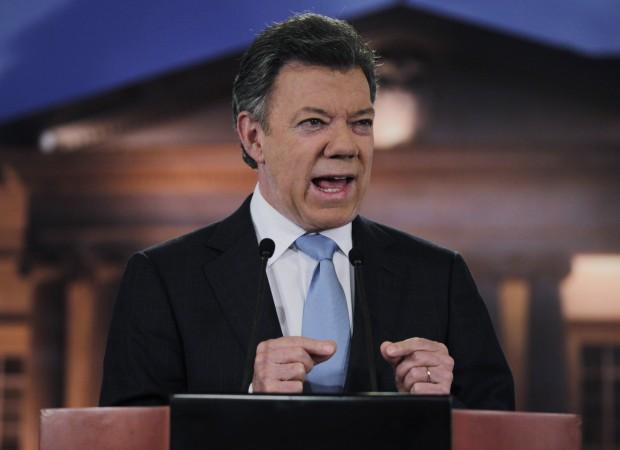Colombia Pursues Talks with FARC Rebels
Colombia’s President Juan Manuel Santos speaks to the media at the Narino Presidential house in Bogota August, 27, 2012. Colombia’s government is seeking peace with the country’s biggest guerrilla group, known as the FARC, and could consider also holding talks with a second rebel group, Santos said on Monday. REUTERS/John Vizcaino (COLOMBIA – Tags: POLITICS CIVIL UNREST)
Colombia’s drug-fueled guerrilla war has gone on for nearly half a century. The last round of peace talks fell apart 10 years ago. But now the Colombian government seems willing to try again.
In a televised speech Monday night, Colombian President Juan Manuel Santos confirmed that talks between his government and leaders of the Marxist Revolutionary Armed Forces of Colombia, or the FARC, are underway.
Santos called them “exploratory talks to end the conflict” but refused to say more. However, former vice president Francisco Santos — the president’s cousin — told RCN radio that the two sides would begin formal peace negotiations in October in Havana, Cuba.
If so, they would be the first peace talks since 2002. Back then, the government withdrew troops from a huge swath of southern Colombia to convince the FARC to negotiate. Instead, the rebels used this DMZ to launch attacks and stash kidnapping victims. After three years and no progress, the government pulled the plug on the talks.
However, a decade ago the guerrillas were far stronger and believed they would march triumphantly into the Colombian capital of Bogota. Since then, a military offensive has cut the rebels’ troop strength in half and they now seem more willing to make a deal.
Fabián Ramirez, a top FARC commander, recently told a British TV reporter that it’s time to end the war.
Colombian lawmakers helped pave the way for peace talks in May by passing a constitutional amendment that would pardon guerrillas for many of their crimes and allow them to participate in politics if they disarm.
Mauricio Rodriguez, Colombia’s ambassador to the United Kingdom, told the BBC that the government and FARC envoys may also discuss issues like land reform.
“So I would say, in general, some social reforms and the guarantee of political space for the guerrillas to abandon their arms and engage in politics,” Rodriguez said.
Still, Colombians are divided over whether the government should sit down with the rebels. The FARC started out as a band of peasants seeking land reform and social equality. But today the FARC is widely considered a terrorist group that funds its war through drug trafficking and extortion.
Former Colombian President Alvaro Uribe maintains FARC fighters should either be confronted on the battlefield or imprisoned. In a speech on Monday, Uribe said Santos was making a grave mistake.
“The only thing that should be discussed with terrorists is the process of turning themselves in to face justice,” Uribe said. “This government has abandoned the people in order to negotiate with terrorists.”
However, the FARC is nowhere near defeated.
The rebel army still has about 9,000 fighters. They have recently stepped up their attacks on government troops, oil pipelines, and electric towers. On Sunday, suspected FARC rebels set off a car bomb that killed six civilians. According to the defense ministry, acts of “terrorism” were up 53 percent in the first seven months of this year compared with the same period last year.
In other words, the war could drag on for years. By contrast, peace talks could help FARC leaders make the transition to legal politics, says Colombian Attorney General Eduardo Montealegre.
“I would prefer to have them serving in Congress rather than kidnapping people and sowing violence across Colombia,” he said.
If negotiations with the FARC go well, the country’s second-largest guerrilla group, the National Liberation Army, or ELN, says it, too would like to join peace talks with the government.
